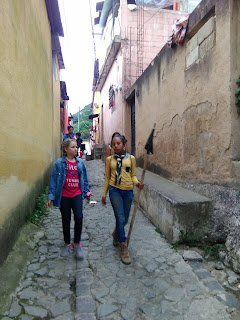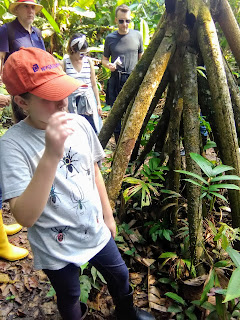
Basia testing a new IPhone, 2018
In this digital age, children are spending more time interacting with a screen rather than a parent.
Technology
has become an integral part of everyday life and has changed the way students
learn or parents work. Technology has the potential to add value to our
families, but it can also erode a sense of togetherness and hinder a child's
emotional growth.

Basia in Apple Store, NYC 2018
“Average Kid Spends 6.5 Hours a Day Looking at Screen.
That doesn't include the time they use screens
That doesn't include the time they use screens
for
school and homework.”
- “Screenagers”
The
documentary which explores how learning, playing and socializing online affects
teens' developing attention span, fragile self-esteem and moral instincts. “Screenagers”
examines the real risks of failing in school, social isolation and digital
addiction. Ultimately, the film explores solutions to handle screen time and
provides parents with tools to help young people develop self-control and find
balance in their digital lives.
Read more interesting facts from studies on mice, preschoolers and students.
Read more interesting facts from studies on mice, preschoolers and students.
Connect
with your Kids
Consider
Family GAMES, SPORT, TALK,
Tech-Free Activity Time
Tech-Free Activity Time
The TABLE is an excellent place for families to reconnect.
A
well-worded QUESTION is the quickest way to connect after a long day. Use small, silly, innocent question to start
conversation, eg. What funny thing did you see today? What surprised you? What
made you to think? https://thefamilydinnerproject.org/conversation/conversation-starters/
Good start “DINNER GAMES”:
Telephone
This
classic game was practically made for the dinner table. Have one person think
of a sentence or phrase, and have him whisper it into the next person’s ear.
When the last person hears the phrase, she repeats it to the group, and the
person who started the game can see how close she got!
Fruit and Vegetable Game
One
family member (the leader of the round) thinks of a person known by everyone at
the table. Then, others ask the leader metaphorical questions to try to guess
the person. For example: “If the person were a vegetable, what vegetable would
she be?” “If he or she were a fruit/animal/color, which one would she be?” The
idea is to stick to figurative rather than literal thinking. Whoever guesses
the person first gets to be the leader of the next round.
Alphabet Game
As
a group, choose a category such as animals, countries, singers, or “people our
family knows.” One family member starts the game by naming a person/thing from
that category that starts with the letter “A.” Then the next person names a
person/thing that starts with the letter “B,” the next person finds something
for the letter “C,” and so on.
Two Truth and a Tall Tale
Ask
everyone at the table to say three things about themselves: two true things and
one thing that’s made up. The rest of the table will guess which is the tall
tale. Sometimes this game is easier if everyone gets a chance to write down
their three things before sharing.

Play OLD GAMES - All Ages, Anytime



































No comments:
Post a Comment